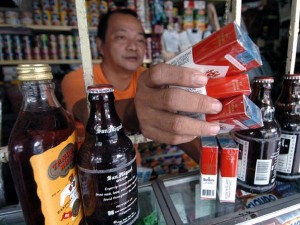
HIGHER SIN TAXES A grocer sells beer, rum and cigarettes to a customer (not shown) in Manila. Malacañang has reiterated its call for the passage of the so-called sin tax bill, saying that based on the proposed law, the government can earn P60 billion a year. AFP PHOTO Joel NITO
Malacañang has reiterated its call for the passage of the so-called sin tax bill, saying that based on the proposed law, the government can earn P60 billion a year.
Budget Secretary Florencio B. Abad said the projected revenue included P33 billion earmarked for indigents’ health insurance.
“The Aquino administration continues to support the indexation of sin taxes on tobacco and alcohol to inflation as a key reform measure,” Abad said.
The proposed measure—aimed at unifying excise tax rates within three years of implementation—allows the automatic adjustment of tax rates using the relevant tobacco and alcohol indexes that the National Statistics Office established.
Abad added that the revenues would be used to cover expenses for universal healthcare for the second quintile of poor households, noting that the proposed national budget for 2012 already provided for the poorest 20 percent among the poor.
He denied reports that the Department of Budget and Management was opposing the indexation of sin taxes and the earmarking of its revenues for key social services.
He said such reports were based on an outdated position paper that the DBM submitted to the House committee on ways and means in November 2010 when there was yet no official position of the Aquino administration on the indexation of sin taxes.
“The President’s inclusion of the measure in the Ledac [Legislative-Executive Development Advisory Council] list of priority bills has reversed that old position,” he said.
“Unfortunately, certain sectors who oppose the indexation of sin taxes recycled our old position and tried to peddle it as new to the public through the media,” he said.
The budget chief said President Aquino pushed for the restructuring of sin taxes to fund universal healthcare among Filipinos, with the ultimate goal of reducing the consumption of alcohol and tobacco.
Also, Abad said portions of the revenue that would be generated might also fund programs for promoting economically viable alternatives for tobacco farmers and workers.